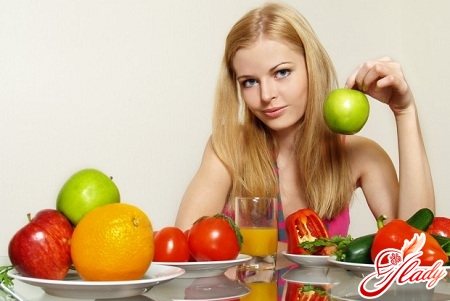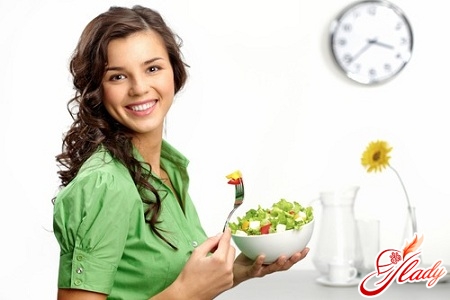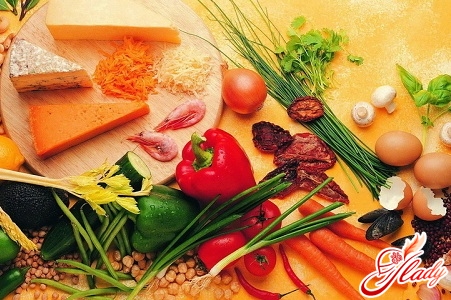 Vegetarianism: "for" and "against". This eternal dispute exists as much as the phenomenon itself. Who is right, but who is mistaken? It is very difficult to answer this question unequivocally, so we will just tell you about the positive and negative aspects of vegetarianism. Well, the decision, of course, remains for you.
Vegetarianism: "for" and "against". This eternal dispute exists as much as the phenomenon itself. Who is right, but who is mistaken? It is very difficult to answer this question unequivocally, so we will just tell you about the positive and negative aspects of vegetarianism. Well, the decision, of course, remains for you.
Vegetarianism and its varieties
Let's try to sort things out in order. What is vegetarianism? Are those who shun vegetarianism, against which there are a thousand arguments, are right? The word "vegetarian" has English roots and is translated as "plant", "vegetable". Vegetarianism is a food system, which is characterized by a refusal to eat flesh of any animals. There are several types of vegetarianism, of which the strictest is considered to be strict vegetarianism, which includes the rejection of both the consumption of animal meat and the products produced by animals (milk, eggs). The position is very ambiguous - there are jokers who say that vegetarians are those people who do not eat animals. But they "eat" them, making the animals a serious competition in eating their food: herbs, vegetables, fruits. Vegetarianism has several directions, but the basis for each of them is an unqualified ban on the consumption of meat of animals and poultry, as well as fish and other seafood. To more accurately understand the directions of vegetarianism, we will consider in more detail their principles:
- Lacto-ovo-vegetarianism - this kind of vegetarianism allows the consumption of milk and eggs.
- Lactovegetarianism - milk consumption is allowed, but eggs are considered an unacceptable product.
- Ovo-vegetarianism - on the contrary, allows the consumption of eggs, but excludes milk from the diet.
- Veganism - prohibits the use of both meat and milk.
Vegetarian followers tend to be more likelyare found in countries with a high standard of living. In countries with a low standard of living, the issue of vegetarianism is not so acute, since the moral and ethical principles regarding food are much less relevant there. And it's not surprising when the global problem becomes the need to feed themselves and the family. 
Causes of Vegetarianism
Beliefs, according to which people come to vegetarianism, are very different:
- Humane considerations
Someone stops eating meat from animalsfrom ethical and moral beliefs, considering the destruction of animals as inadmissible as the killing of people. They explain this by saying that no living being should be killed for food. However, opponents of vegetarianism in response to such a statement give a very convincing counterargument. They argue that the concept of "living organism" in this case is controversial - after all, plants and mushrooms are alive. All of them have a certain duration of the life cycle, they grow, multiply, die. From this point of view, cutting dill for a salad is no different from slaughtering cattle on a farm. A campaign for mushrooms and does recalls the terrible pictures of the past, when the Tatar-Mongol invasions ravaged whole villages. Well, what can I say about boiling water? After all, as a result, thousands of microorganisms die under the influence of temperature! By the way, antibiotics can also be equated with mass murder, do not you think? You will think that the microflora is pathogenic and can lead to the death of a person. She's also alive! Of course, such examples are slightly exaggerated, but they also have the right to exist, do not you think? But we got a little distracted.
- Religious Beliefs
Another reason for not eating meatare religious beliefs (Buddhism, Hinduism). In this case, it is difficult to judge something - these are the features of a particular religious teaching. Although in most cases it is only about the posts, and not about the complete abandonment of animal food.
- Care for health
Other people piously believe that refusing foodAnimal health will improve their health. Like, such a diet will reduce the likelihood of atherosclerosis, cardiovascular diseases, etc. Of course, there is some truth in such statements. However, few people think that a plant diet deprives a person of many valuable and vital substances, for example, animal protein.
- Saving money
There are also people who promoteVegetarianism as a way of life, which will help to cut sometimes outrageous expenses for food. Of course, this issue is relevant for many. However, it is rather controversial if one considers that the cost of vegetables and fruits in winter can significantly breach the wallets of the hapless "economist". In addition, on the fruit and vegetable counters of our country, the choice is not so great. And besides, some of the products are completely dangerous for health, since they are stuffed with an excessive amount of fertilizers and other harmful substances. If you conduct a chemical analysis of the "winter" vegetable, you create a feeling of active walking through the periodic table. By the way, to a great regret, not only winter fruit-vegetables sin the same. Take, for example, a watermelon. How many people know the technology to accelerate the color of watermelon? Probably, it is worth keeping silent about this, so as not to discourage the love of these melons from the readers. I would like to take this opportunity to remind readers that doctors have a version that says that it is best to consume fruits and vegetables of their own strip, i.e. the strip in which you live, which from childhood "known" to your stomachs. It is often impossible to grow all the vegetables and fruits on their household plots, as many live in the so-called "risk farming zone". It turns out that if you consume vegetables and fruits of your strip, then their choice is significantly reduced. Moreover, fruits and vegetables are not growing all year round, as the climate does not contribute to this particularly. Of course, fruits and vegetables can be preserved, as our mothers and grandmothers did before. But still the most part of useful microelements and vitamins is lost. And the alternative way - to freeze and store so much that would be enough for a family - is simply unrealistic for the average resident, due to the lack of storage conditions. Therefore, the question of vegetarianism as a way to save is, to put it mildly, controversial.
- Adherents of naturalness
The next category of people who classify themselves asvegetarians, is convinced that for people vegetative food is more natural. Although this raises doubts, we digest meat and it's very good. Therefore, there is a feeling that people who become vegetarians simply pay tribute to fashion. If we consider the physiology of human structure and try to understand to whom we are closer in the structure of external and internal organs, the picture will look something like this:
It turns out that for some physiological characteristics people are still closer to herbivorous than carnivorous? Maybe. 
Is vegetarianism harmful?
So, we came to the most important question -Is vegetarianism harmful to human health? It is impossible to answer this question unequivocally. Most likely, the harm of vegetarianism will be very noticeable in the event that you stop consuming food of animal origin, not taking care to properly replace it.
- Lack of certain vitamins
The hardest part is for those vegetarians whothey refuse to consume absolutely all products produced by animals. They will have to take some vitamins, including vitamin B12, chemically synthesized, bought at the pharmacy. And, for the sake of justice, it should be recalled that whatever a huge complex composition of vitamins and minerals was not indicated on the bank, only 1-2 vitamins are digested. Therefore, give preference to specific vitamins, not complexes. It is best to ask the doctor to choose the most suitable drugs for you.
- Amino acids and iron
Damage to vegetarianism with imbalancediets will also consist of a deficiency of amino acids and iron. And this is not surprising, because some amino acids people get exclusively with food. And most of these most essential amino acids are contained in meat. Many opponents of vegetarianism unanimously assert that the absence of meat will inevitably lead to the development of iron deficiency anemia. However, this is not at all the case. The iron necessary for man is not only in meat. For example, in apples. But we do not eat apples in such quantity that this need of our organism was completely satisfied, unfortunately. And if these apples grew unknown where, and were treated something from pests, then their usefulness raises huge doubts. Some sources suggest replenishing amino acids and vitamins by eating legumes, such as lentils and soy, nuts and coarse grits. But, probably, it is worth recalling the widely known fact that consumption of soy in large quantities leads to the destruction of the thyroid gland.
- Excess body weight
Very often you can hear that the transition tovegetarianism helped to get rid of extra pounds. And in the shortest possible time and without any effort. However, doctors do not agree with this. Very many vegan foods are highly caloric. For example, nuts. They, of course, are very tasty and useful, but do not forget about their calorie content.
- Walnut in 100 grams - 700 kcal,
- Brazil nut in 100gr - 703 kcal,
- pine nuts in 100 gr - 620 kcal,
- almonds in 100 gr - 694 kcal,
- hazelnut in 100 gr - 707 kcal,
- pistachios in 100 gr - 610 kcal,
- peanuts in 100 gr - 551 kcal,
- cashew nut in 100gr - 633 kcal,
- nut pecan in 100 gr - 861 kcal,
- a coconut in 100gr - 669 kcal.
For people who try to control their ownweight, these figures speak volumes. A woman who wants to lose weight or just keep her weight is recommended to consume 2000 calories per day, provided that she still has some additional physical load. For comparison, in a 100 gram milk chocolate bar - 522 kcal, dark chocolate containing 85% what and 99% cocoa - 530 kcal, white porous chocolate per 100 grams - 547 kcal. It turns out that people who control their weight, it is safer to eat chocolate than nuts, especially since 100 grams of nuts is quite small, but 100 grams of chocolate is easy to measure, this is exactly one tile. Just do not forget that some of the foods that vegetarians recommend to eat include starch - potatoes, cereals. Starch causes secondary hunger, like all foods with a high content of rapidly absorbed carbohydrates into the blood. Carbohydrates, getting into the blood, quickly raise the level of sugar in the blood. Twenty minutes later, the blood sugar level also drops sharply, to which our body reacts like hunger. Therefore, the possibility of losing weight with vegetarianism raises doubts. Although, eating more vegetables and fruits helps to cleanse the body due to coarse fiber fibers. It is also common to "charge meat" in the delivery of excess cholesterol to the body. Yes, cholesterol is bad ... However, it's all about quantity. It has long been known that in a spoon - a medicine, and in a cup - poison! The same action has and cholesterol. In fact, this "harmful component" is needed by our body, only in reasonable doses.
Vegetarianism and sports
It is impossible not to mention the "relationship"vegetarianism and sports lifestyle. Opponents of vegetarianism argue that it is impossible to engage in sports in the event that a person feeds inadequately. However, as practice shows, vegetarianism and sports do not interfere with each other. In Stockholm, scientists conducted a series of experiments in which athletes-athletes participated. With different diets, athletes were forced to pedal the bicycle ergometer at a certain load until exhaustion.
- At the first stage, the athletes were fed mixed food, which included meat, vegetables, potatoes. After 1 hour and 54 minutes, exhaustion ensued.
- At the second stage, athletes used high-calorie food, with a high content of protein and animal fats. Exhaustion came in 57 minutes.
- In the third stage, athletes were fed foods high in carbohydrates, such as potatoes, corn, bread, vegetables. In the latter case, exhaustion only occurred after 2 hours and 45 minutes.
Part of the vegetarians who allowconsumption of milk and eggs, can maintain the necessary level of protein and meet the body's need for essential amino acids due to protein mixtures and other sports supplements. In short, there are many examples where athletes consume meat and achieve high results. As well as vice versa, but in this case it is worth recalling that the nutrition of athletes doctors are watching much more closely than we are in our usual and everyday life. From all this we can conclude that vegetarianism and sport are not mutually exclusive concepts. And full-scale serious studies on the influence of vegetarianism on sporting successes and achievements have not been conducted.
Lifespan
If we consider the influence of vegetarianism onlife expectancy, then here it is possible to find controversial points. On the one hand, in India, where about 20% to 40% of people who propagandize vegetarianism - the average life expectancy is 62-63 years. On the other hand, in the Caucasus, whose inhabitants are known for traditional meat consumption, life expectancy rates are much higher. It is very difficult to come to an unequivocal opinion about vegetarianism. Is it a panacea for all ills or evil? Everyone is free to choose the lifestyle that he likes and that food, which, it seems to him, will be the most suitable for him. We advise you to read:









